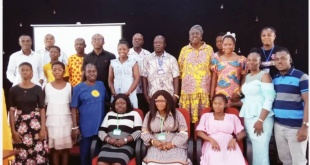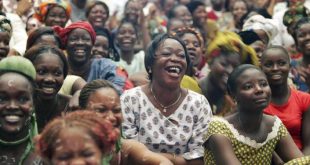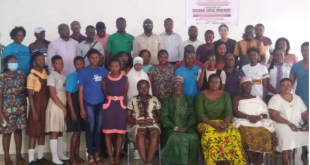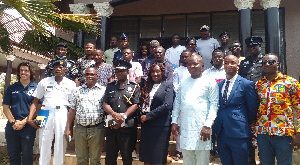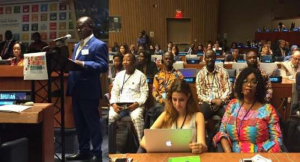 Accra, July 20, GNA – Ghana presented its first Voluntary National Review (VNR) report on the implementation of the 2030 Agenda for Sustainable Development at the 2019 High-Level Political Forum (HLPF) at the United Nations (UN) on 17 July.
Accra, July 20, GNA – Ghana presented its first Voluntary National Review (VNR) report on the implementation of the 2030 Agenda for Sustainable Development at the 2019 High-Level Political Forum (HLPF) at the United Nations (UN) on 17 July.
The HLPF is part of the follow-up and review arrangement for the 2030 Agenda and provides a platform for reviewing the progress of implementation of the Sustainable Development Goals (SDGs), mutual learning, and forging of partnerships to accelerate the implementation of the SDGs.
A statement issued by the National Development Planning Commission (NDPC) and copied to the Ghana News Agency said the HLPF on Sustainable Development commenced on Tuesday, 9 July, at UN Headquarters in New York under the theme “Empowering people and ensuring inclusiveness and equality” and closes on Friday, 19 July.
It said the 2019 HLPF, brought together over 2000 participants from governments, businesses, academia, civil society organisations, youth groups and United Nations Agencies.
Professor George Gyan-Baffour, the Minister of Planning and Member of Parliament for Wenchi, presenting the review report on behalf of government revealed that Ghana has made progress on many of the SDGs targets adding that “overall, poverty had declined marginally from 24.2 pe4 cent in 2013 to 23.4 per cent in 2017.
He said growth in GDP remains robust, accelerating to 8.1 per cent in 2017, thus making Ghana the second-fastest growing economy in Africa in that year.
He said key macroeconomic indicators, including the budget deficit, inflation and interest rates were trending downwards, adding that trade balance recorded surpluses in 2017 and 2018, leading to improved balance of payment position.
Touching on the social sector, he stated that access to education, especially at the senior high school level, had generally improved.
This, he attributed to the introduction of Government’s free Senior High School (SHS) flagship initiative which resulted in additional 271,000 students enrolling in SHS for the 2017/18 and 2018/19 academic years.
He said gender parity has been achieved at the basic level.
According to the Minister, the proportion of the population with access to electricity has also improved from 70.6 per cent in 2013 to 81.1 per cent in 2017.
On the environment, there had been a marginal increase in forest cover. Ghana has commenced the implementation of the Forest Plantation Strategy 2017-2040, with the aim to protect the forest cover to achieve a sustainable supply of planted forest goods and services.
The Minister in his presentation highlighted several important lessons from the implementation of the SDGs in Ghana.
These included, the importance of developing strategic partnerships with key stakeholders; building strong linkages among government, research institutions, academia, private sector and other stakeholders for research and innovation; enhancing the capacity of sub-national structures for effective implementation of the SDGs; mobilising adequate domestic resources to sustain and expand current interventions and; strengthening the capacity to generate and use administrative data for monitoring outcomes.
Touching on some of the implementation challenges, Prof Gyan-Baffour said, sustained financing is critical for the realisation of the SDGs.
He said improving domestic resource mobilisation and leveraging available resources from the private sector would be required to accelerate the implementation of priority interventions.
Addressing data challenges associated with the implementation of the 2030 Agenda, the Minister said, the government was implementing a data roadmap with three priority areas for action – filling data gaps, encouraging data use strengthening the data ecosystem.
The statement said the beauty of the presentation of Ghana’s VNR was that government was doing it jointly with the CSOs platform on SDGs, illustrating to the world the partnership arrangement that exists between the two.
It said in the spirit of “leave no one behind”, the CSOs presentation was done by Mr Alexandra Bankole Williams, a visually impaired person who was guided from the lectern to his seat by the Minister.
The statement said the CSOs platform was grateful to the Government for the opportunity to work together on the SDGs implementation and indicated their readiness to collaborate with the government to improve awareness creation on the SDGs.
Mr Williams said: “Citizens’ awareness of the SDGs was crucial because many of the SDGs can only be achieved through behavioural change.”
The representative of the CSOs platform also called on the government to help strengthen the capacity of CSOs in the area of efficient data collection, in view of the fact that they also produce complementary data for monitoring progress.
Other Ministers of State who took part in the 2019 HLPF were Dr Matthew Opoku-Prempeh, Minister of Education; Mr Ignatius Baffour-Awuah, Minister of Employment and Labour Relations; Madam Patricia Appiagyei; Deputy Minister of Environment, Science, Technology and Innovation; Madam Abena Osei Asare, Deputy Minister of Finance and Madam Barbara Ayisi Asher, Deputy Minister for Works and Housing.
GNA
 DCI-GHANA Defence for Children Internation
DCI-GHANA Defence for Children Internation

